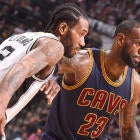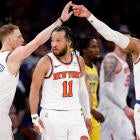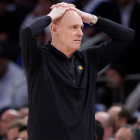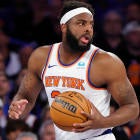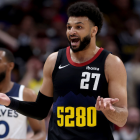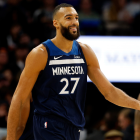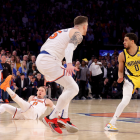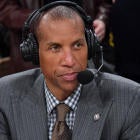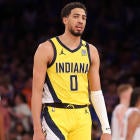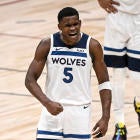In hindsight, LeBron James agreeing to sign with the Lakers wasn't all that surprising. All signs have been pointing that way, really, since the Cavs gift-wrapped much of the cap space Los Angeles needed with that February trade that sent the Lakers two expiring contracts in Channing Frye and Isaiah Thomas (Thanks for that, by the way).
What perhaps was, or is, surprising is the length of LeBron's commitment to the Lakers -- three years, at a minimum, with a player option on the fourth year of a $154 million deal. That puts the Lakers in an interesting spot. Had LeBron signed, say, a one-and-one deal (one year with a player option on the second), like the one Kevin Durant will sign with Golden State, there would have been more pressure on Magic Johnson and the Lakers to put a championship-contending team on the floor right away, which might well entail forcing a Kawhi Leonard trade, in order to convince LeBron to stay long term.
Now, they know they have James for three years at least, which affords them the option of remaining patient, holding onto their young assets, and simply waiting for Leonard to come to L.A in free agency next summer.
The fear in doing this, of course, is there is no guarantee Leonard comes next summer. Yes, he has said he wants to end up with the Lakers. But so did Paul George. When the Thunder made the move for George last summer, they did so with the knowledge that he could very well be a one-year rental. But they used that year to sell him on their team, their culture, and their plan moving forward. It worked.
What if Kawhi goes to Philly, or Boston, enjoys his experience, makes it to the Finals, sees a young team with a long stretch of true championship contention ahead of them, and reconsiders his desire to end up with the Lakers? It's not at all unfeasible. There are already whispers that Leonard would consider staying with the Sixers long term should he be traded there, and you can understand the appeal of that potential situation next to Joel Embiid and Ben Simmons in a heavily depleted Eastern Conference just waiting to be dominated.
So what do the Lakers do?
This is where we have to talk about Brandon Ingram, who would figure to be the centerpiece of any deal the Spurs would consider in exchange for Leonard. How good can he really become over the next few years? That's the question. We're not talking about what kind of player he'll be five years down the road. We're talking about the next few years, as the Lakers have clearly put themselves in the business of winning a title, if not multiple titles, during LeBron's tenure. Anything to come after these three or four years is not a consideration right now.
To that point, if you're operating in the three-year window that you have LeBron guaranteed, can you really afford to waste one of those years with a roster that is probably, as currently constructed, a lower-half playoff team in a loaded Western Conference? Do not forget that LeBron is entering his 16th season. Understanding that the guy has been Terminator durable, every healthy year at this point of anyone's career, on some level, has to be maximized. If the Lakers wait until 2019 to get Kawhi, that's one year of not taking full advantage of having LeBron -- or 33 percent of the time you're guaranteed to have him.
Before you process that last paragraph and conclude that yes, the Lakers should mortgage their after-LeBron future and go hard after Leonard right now, remember the Cavs got themselves in this sort of bind by selling out their future at every turn to put a title-contending team around LeBron during his last four season. Consider that since Cleveland drafted LeBron in 2003, it has had four No. 1 overall picks -- LeBron, Kyrie Irving, Andrew Wiggins and Anthony Bennett -- and not a single one of them still plays for them. That was worth it in Cleveland or more specifically in the East, where you're virtually guaranteed a Finals berth so long as you have LeBron and a few competent parts to take turns playing decently well here and there.
The West is different. LeBron isn't enough. LeBron and Kawhi together probably isn't enough. You likely need a third star in there, and Ingram might be that guy in the mold that Jayson Tatum might be the homegrown star to put alongside Kyrie Irving and Gordon Hayward in Boston. The Lakers took Ingram No. 2 overall just two years ago. The kid is only 20 years old and trending toward being an All-Star-caliber player very shortly, and a potential franchise cornerstone beyond that. Giving up a guy like that stings, even with a guy like Leonard coming back, especially when you can probably get Leonard anyway by waiting a year.
If it sounds like I'm going in circles with this, arguing both ways while getting no closer to a confident answer, I am. The Lakers are likely doing the same thing right about now. Because there is no clear answer -- other than to have it both ways ... like the Celtics. Boston has brilliantly navigated this fine line of acquiring big-time, win-now talent in the present without compromising their future. They've added Al Horford, Irving and Hayward while still drafting, and hanging onto, guys like Jaylen Brown, Tatum, Marcus Smart and Terry Rozier.
But remember, the Celtics were set up to play it both ways by that 2013 heist they pulled on the Brooklyn Nets. The league learned from that. Nobody will ever make a deal like that again. The Lakers certainly cannot lean on the fruits of such a deal. If they want a haul, they're going to have to give up a haul. That's the way it works. And it is a very, very tough call to make. It sounds dramatic, but the future of the franchise, both in the short and long term, may hang in the balance.













